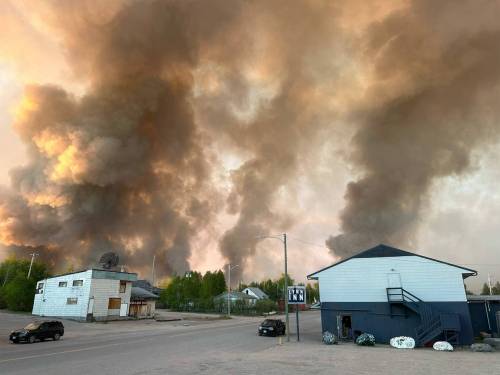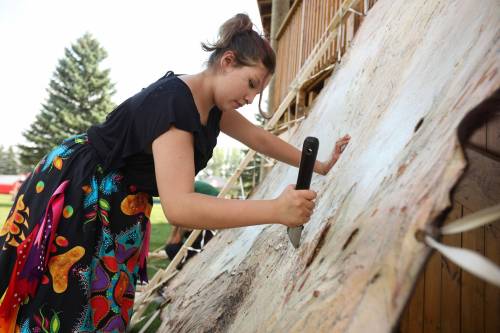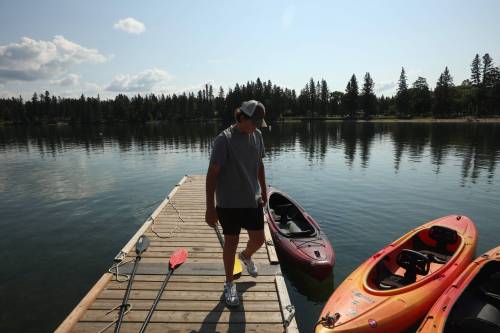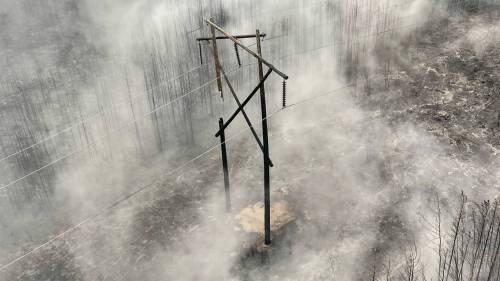Indigenous Education
Please review each article prior to use: grade-level applicability and curricular alignment might not be obvious from the headline alone.
First Nations accuse Hydro, province, feds of profiting from land
2 minute read Thursday, Oct. 30, 2025Two First Nations are suing Manitoba Hydro and the provincial and federal governments, claiming the institutions have made billions of dollars through hydroelectric operations on land the communities never agreed to cede.
In a statement of claim filed last week in the Court of King’s Bench, Canupawakpa Dakota Nation and Dakota Tipi First Nation in southern Manitoba are seeking damages for alleged infringement on their rights.
The court filing accuses the public utility, the province and the federal government of breaching duties owed to the Dakota nations and of unjustly enriching themselves at the expense of the communities, without consultation.
“The yearly revenue Manitoba Hydro produces from the land and particularly, the activities, is substantial,” reads the lawsuit.
Big things are ahead for northern Manitoba.
Political leaders at every level are focused on unlocking the North’s tremendous potential, and what sets this moment apart is the scale — which comes with the need for thoughtful planning that includes people, not just infrastructure, to help us realize the opportunity ahead.
Churchill could emerge as a vital Canadian port, with year-round shipping supported by icebreakers, an upgraded railway and all-weather roads connecting isolated communities. Upgrading Manitoba Hydro’s northern transmission system and investing in new projects like the Kivalliq Hydro-Fibre Link, would deliver clean energy and broadband—opening new possibilities for families and businesses across Northern Manitoba and Nunavut. Major mining initiatives are advancing and have been recognized as nationally significant.
These ambitious undertakings have the potential to transform Manitoba, benefiting all Manitobans — especially those in the North — with good, new jobs. Realizing this future will require people (thousands of them) —welders, carpenters, electricians and heavy-duty mechanics to build and maintain energy and transport systems; operators to construct roads; IT specialists and logisticians to run modern supply chains; and nurses, teachers and social workers to strengthen communities as they grow. With large-scale projects underway across Canada, competition for a skilled workforce will be fierce.
Schools work to fulfil promise afforded by new law supporting Indigenous language
5 minute read Preview Tuesday, Sep. 30, 2025Silenced no more: Indigenous languages celebrated at site of former residential school
4 minute read Preview Tuesday, Sep. 30, 2025Most refused to listen then, more understand now
6 minute read Preview Monday, Sep. 29, 2025Only moratorium can save moose population: MWF
4 minute read Preview Wednesday, Sep. 24, 2025Motion to rename park withdrawn after MMF complaint
3 minute read Preview Tuesday, Sep. 23, 2025Wildfires like this aren’t normal. Stop trying to normalize them.
“Bring a pair of pants and a sweater to Clear Lake — it’s unseasonably cool because of the wildfires.” That was just one of those meteorological idiosyncrasies, attempting to reach back deep into long-forgotten geography lessons, that may seem obvious to those on the Prairies. But for the outsider, a visitor from Toronto, and indeed a relative newcomer to Canada, it was certainly a shock, and a stark reminder that I would be flying into a province still under a state of emergency, which had until recently been decimated by wildfires. It was also an introduction into what may be considered ‘normal’.
Visiting Manitoba this August was extraordinary — the people most certainly lived up to the “friendly” billing that adorns the licence plates, and the scenery of Riding Mountain National Park was worth the trip alone. However, there were a number of topics of conversation that made me question what I had come to know as accepted wisdom.
Talk about fishing restrictions, Indigenous rights, oil and gas permeated discussions, with healthy, good spirited debates. But for me, the most vexing issue was wildfires. More specifically, the extent of their aftermath, effects, and associated restrictions, have become normalized.
Introduction to Michif — one word at a time
4 minute read Preview Friday, Sep. 19, 2025Hudson’s Bay seeks approval to auction off 1670 charter, court filings show
5 minute read Preview Friday, Oct. 10, 2025After summer evacuation, northern students ready to hit the books
4 minute read Preview Friday, Sep. 19, 2025Province creates hunting buffer zone on Bloodvein First Nation
3 minute read Preview Monday, Sep. 15, 2025Bearing witness to what should never have been
5 minute read Monday, Sep. 15, 2025In recent days I have been listening again to the voices of adults who shared what they went through in the foster care system, residential schools and the forced adoption practices of the ’60s Scoop.
First Anishinaabe woman Bar Association president prioritizes mentorship, protecting the rule of law
8 minute read Preview Sunday, Sep. 14, 2025Nation building needs research — not just infrastructure
4 minute read Saturday, Sep. 13, 2025Living through the second Trump administration as a Canadian has been likened, by one commentator, to a teenager being kicked out of the house. We must grow up fast and deal with the fact that we can now only rely on ourselves. So, the federal government is moving fast on files related to security, sovereignty and connectivity. The Liberals passed Bill C-5 to expedite projects that will help Canadians live on our own. Wonderful.
But.
In our rush forward, we cannot overlook the power of nation-building research, which must go hand-in-glove with these infrastructure projects. Research and infrastructure are not competing priorities: they are essential partners in nation-building.
Bill C-5, the Building Canada Act, grants the federal government sweeping powers to quickly build large projects that help goods move faster and more easily. This act intends to strengthen our security, autonomy, resilience and advance the interests of Indigenous Peoples. But there can be no nation-building without nation-building research.
For elders with dementia, youth with anxiety, or evacuees coping with displacement, smoke is not just a public health irritant. It’s an accelerant for mental health issues.
You can’t put an N95 on your brain. You can’t tell your nervous system to calm down when the air outside looks like dusk at noon.
For older adults, people with asthma, families on fixed incomes, or those living in crowded apartments or trailers, wildfire season in Manitoba is more than just a nuisance. It’s a trigger. Of breathlessness. Of panic. Of helplessness.
And every year, the advice is the same:


















